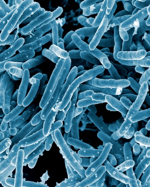immunology wars
may your immune system defend you
Bacteria

Bacteria are microscopic, single-celled organisms that often infect host cells in order to replicate. This can cause tissue damage and disease; some areas of the body are much more susceptible to bacterial infection, especially areas that are in direct contact with the environment, such as the eyes, nose, mouth and gut.
The immune response to bacteria is wide and varied, involving direct killing via the complement system, phagocytosis by neutrophils and macrophages and cell-mediated immunity, where a macrophage or dendritic cell presents fragments of the bacteria to a T-lymphocyte activating the adaptive immune response.
It is important to note that not all bacteria cause disease and many bacteria are beneficial and help maintain homeostasis (balance) within our body. In fact, we have more bacteria than our own cells!

Mycobacterium tuberculosis. Source: NIAID (CC)
Cells
- Basophils
- Eosinophils
- Mast Cells
- Neutrophils
- Monocytes / Macrophages
- Natural Killer Cells
- Dendritic Cells
- B-Lymphocytes
- T-Lymphocytes
- CD4+ T-Lymphocytes
- CD8+ T-Lymphocytes
- Regulatory T-lymphocytes
- Th17 Lymphocytes
